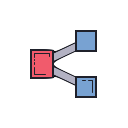Overview:
TheClone block helps efficiently create an array filled with repetitive elements based on user-defined criteria, offering flexible options for both simplicity and complexity in data handling.
Inputs & Outputs
| I/O | Feature | Type | Simple Explanation |
|---|---|---|---|
| input | element | any | The element to be repeated throughout the resulting array. |
| input | array_size_to_match (optional) | any[] | An optional array used to dictate the size of the new array, based on its length if provided. |
| input | number_of_copies | number | Indicates how many times the specified element will appear in the created array. |
| output | array_of_elements | any[] | The final output is an array populated with cloned elements per the user-defined specifications. |
Use Cases
Consider how this block can streamline various practical applications:- Dynamic Array Creation: When building a feature that requires initializing arrays of specific sizes with default values, this block quickly generates them without manual repetition.
- Placeholder Generation: During development, you may need arrays filled with dummy data for testing or prototyping; using this block saves time and maintains consistency across test cases.
- Bulk Data Simulation: In scenarios where testing system performance with large datasets is necessary, create uniform arrays containing repetitive elements easily without compromising resource allocation.
- Game Development: For creating inventories or player attributes initialized to a standard value multiple times (like health points or item counts), this tool aids game mechanics setup significantly.
Clone block becomes an invaluable asset!